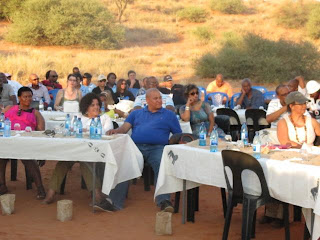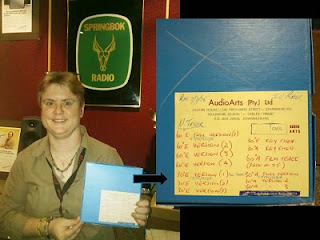The
SABC Radio Archives has acquired the services of four interns since March of this year. The interns are here for a couple of months to acquire valuable skills, but also to help with the workflows in the SABC Radio Archives. They have changed the way the radio archivists work.
NOKUTHULA MZELEMU is a qualified SOUND DESIGNER.
Questions are addressed to the intern to understand the type of skills that they have to offer, but also get a better understanding of what they are doing now here in the SABC Radio Archives.
Please tell us about your personal history as well as your studies. How did you become an intern here at the SABC?
My name is Nokuthula Mzelemu, born and raised in Katlehong which is in the East Rand. Started my school career in 1995 at Germiston High School and matriculated in 2006 at Germiston High School. My passion for the entertainment industry led me to study film at The South African School of Motion Picture Medium and Live Performance “AFDA”. I obtained my Bachelors Degree in Sound Design in 2010. Studying at a film school really helped or gave me a hint rather on what it is that is expected in a working environment. After graduating I then spent the rest of 2010 doing a bit of travelling which was a blessing because it gave me time to really research and try find the best job for me. When a friend of mine sent me an email informing me of this internship opportunity I knew that this was it. I then applied and prayed hard and as always God heard me and I got the call after the interview process that I had made it.
What does your job entail here at the SABC?
I am a sound archivist and by that I help preserve and store material for future use. My job entails me to collect old material which has been saved on a mini disk. I then re-record the music and interview part of the radio show onto Dalet; whilst that is happening I check the levels and adjust them before saving it on the public server for my senior archivist to make use of. I also help with the airchecks (recording of radio programmes that have been identified to be archived), as well as the printing of the different radio programmes onto cd.
What have you learned already while you have been here?
Having a Sound Design background has helped me, but being here has helped me realize that the programs we watch on TV, or hear on the radio are actually stored and re-used for future use. I have learned to work with different people such as my team mates and my senior archivist. I have also learnt to work on a deadline and because the shows I listen to were recorded few years back I am also learning a thing or two about our musical history.
What suggestions do you have for us with regards the preservation and digitization of our audio collections?
Moving from mini disk to cd is a good idea. I think if we had to save time because with time and technology changing cd’s will probably not be used in the future. I think if we could build a hard drive with huge space capacity then it would save a lot of time and space, as space will run out with all the cd’s being kept. If everything gets saved onto the hard drive it lessens the chances of anything bad happening to the content being stored.
Please tell us of any interesting anecdote or funny story with regards your internship here at the SABC
We shall call this story “OUR FIRST PAY CHEQUE”: It all started when all the interns from different departments had speculations about our pay day; we were all so exited…. Mbali, Obakeng, Thakhani and myself had already started planning what we were going to buy (this was the1st big pay cheque for some of us) so when the day came (the day we assumed was pay day) and nothing happened we were all so disappointed. But not to worry because the actual day came and we received sms’s from our different banks. We were so EXITED; calling each other in the morning even treated ourselves to some “expensive” lunch. But sadly one of my fellow team mates didn’t get paid on the same day as us because he had got his banking details wrong. So it was funny as we laughed at him and he would get exited and u could just see the “hope” he had in his eyes with every sms he got. Hahaha “no names mentioned” but none the less he did get paid (after all of us had spent the entire last cent we had). Then at the end the joke was on us.
What are you planning to do after this?
At the end of this 10 month internship program I hope to have familiarized myself with the different sound departments of the SABC. I then plan on taking any job opportunity that may come my way.
Related posts:
SABC Radio Archives: Interview with the intern: Thakani Ramufhufhi
Interview with an intern at the SABC Radio Archives: Obakeng Phiri
Questions and blog post by Karen du Toit,
Afrikaans Archivist in the
SABC Radio Archives.


































